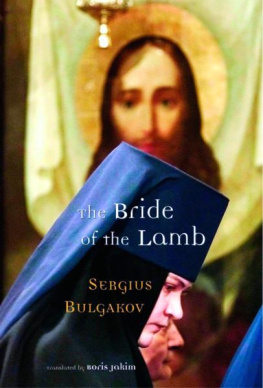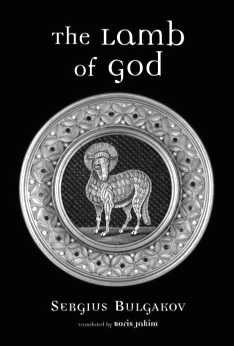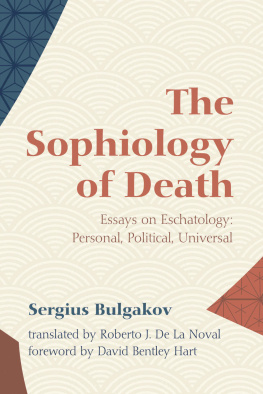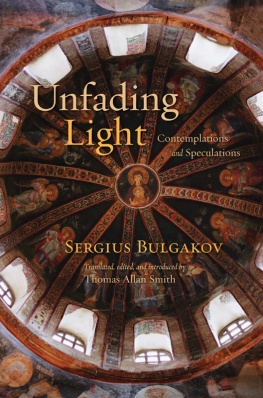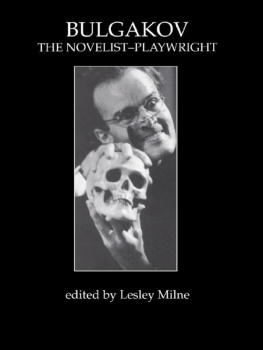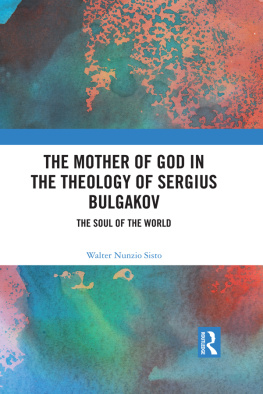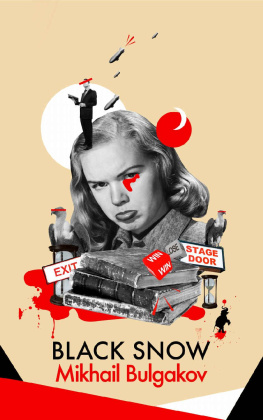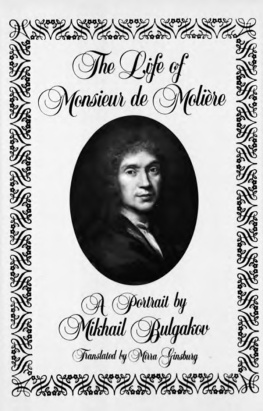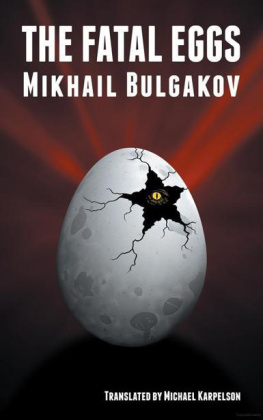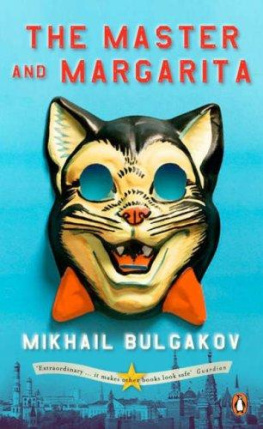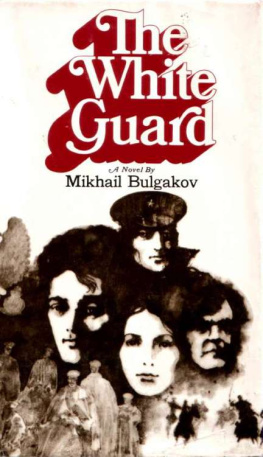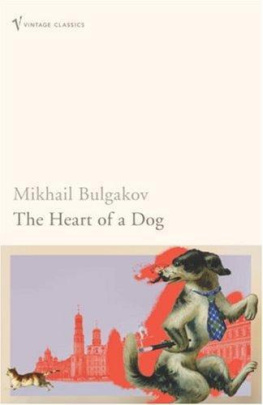Sergius Bulgakov - The Bride of the Lamb
Here you can read online Sergius Bulgakov - The Bride of the Lamb full text of the book (entire story) in english for free. Download pdf and epub, get meaning, cover and reviews about this ebook. year: 2013, genre: Religion. Description of the work, (preface) as well as reviews are available. Best literature library LitArk.com created for fans of good reading and offers a wide selection of genres:
Romance novel
Science fiction
Adventure
Detective
Science
History
Home and family
Prose
Art
Politics
Computer
Non-fiction
Religion
Business
Children
Humor
Choose a favorite category and find really read worthwhile books. Enjoy immersion in the world of imagination, feel the emotions of the characters or learn something new for yourself, make an fascinating discovery.
- Book:The Bride of the Lamb
- Author:
- Genre:
- Year:2013
- Rating:5 / 5
- Favourites:Add to favourites
- Your mark:
- 100
- 1
- 2
- 3
- 4
- 5
The Bride of the Lamb: summary, description and annotation
We offer to read an annotation, description, summary or preface (depends on what the author of the book "The Bride of the Lamb" wrote himself). If you haven't found the necessary information about the book — write in the comments, we will try to find it.
The Bride of the Lamb — read online for free the complete book (whole text) full work
Below is the text of the book, divided by pages. System saving the place of the last page read, allows you to conveniently read the book "The Bride of the Lamb" online for free, without having to search again every time where you left off. Put a bookmark, and you can go to the page where you finished reading at any time.
Font size:
Interval:
Bookmark:



Sergius Bulgakov
Translated by Boris Jakim






SECTION I
The Creator and Creation
SECTION II
The Church, History, and the Afterlife
SECTION III
Eschatology

And the angel said: "Come hither, I will show thee the bride, the Lamb's wife. And he carried me away in the spirit to a great and high mountain, and showed me that great city, the holy Jerusalem, descending out of heaven from God, having the glory of God" (Rev. 21:9-11).
As Sergius Bulgakov makes clear, the Bride of the Lamb is the Church, but she is the Church of the "new heaven and new earth," which appears after all the old barriers and separations have been abolished.
The new Jerusalem signifies the transfigured and glorified world. The world is reconnected with the paradise planted by God, with all that grows in it, including the mysterious tree of life and the tree of the knowledge of good and evil. But the time for such knowledge is past: good and evil in their duality and struggle have been transcended. There is no more evil. But there is also no more good, in its relativity. Only the tree of life remains, which has vanquished death.
The city of God, the Church, the Bride of the Lamb, is the final goal of all natural and historical life, of all of humanity's creative energies and activities. The city of God also represents the goal and conclusion of Sergius Bulgakov's magnum opus, The Bride of the Lamb.
Father Sergius Bulgakov (1871-1944) is the twentieth century's most profound Orthodox systematic theologian. Born into the family of a poor provincial priest, Bulgakov had a strict religious upbringing and entered the seminary at a young age. But owing to a spiritual crisis, in the direction of materialism and atheism, he did not complete his seminary studies. He chose, instead, to follow a secular course of study, which led to his matriculation at the University of Moscow, where he specialized in political economics.
This marked the beginning of his relatively short-lived Marxist period. In 1901, after he defended his master's dissertation, Capitalism and Agriculture (1900), Bulgakov was appointed professor of political economy at the Polytechnical Institute of Kiev. During his years there (1901-6), he underwent a second spiritual crisis, this time in the direction of idealist philosophy and the religion of his youth.
Following this, Bulgakov's intellectual output was, for the most part, theological in character. Indeed, his personal religious consciousness flowered in the following year, and he accepted the call to the priesthood, receiving ordination in 1918.
These years of internal crisis and growth in Bulgakov's personal life paralleled the tumultuous period in Russian political and social life that climaxed in the October Revolution of 1917 and the subsequent Bolshevik ascendancy. In 19 18 Bulgakov left Moscow for the Crimea to assume a professorship at the University of Simferopol. But his tenure was short-lived, owing to Lenin's banishment in 1922 of more than one hundred scholars and writers deemed incurably out of step with the official ideology.
Bulgakov left the Soviet Union on January 1, 1923, traveling first to Constantinople and then to Prague. Finally, having accepted Metropolitan Eulogius's invitation both to become the dean of the newly established Saint Sergius Theological Institute and to occupy the Chair of Dogmatic Theology, he settled in Paris in 1925. Here, until his death (and in 1944, he was to make his most fruitful and lasting contributions to Orthodox thought.
consists of volumes on Christology (The Lamb of God, 1933), pneumatology (The Comforter, 1936), and ecclesiology and eschatology (The Bride of the Lamb, published posthumously, 1945).
started in the 1840s with the Slavophiles, especially Aleksei Khomiakov (1804-60) and Ivan Kireevsky (180856). This group introduced the key idea of sobornost (derived from the Russian sobirat', to gather, and related to sobor, council). Sobornost was considered by Khomiakov to be embodied in the Church as a divinely inspired fellowship. It is community in love, communion in the spirit, the free union of the faithful in the pure heart of the Church.
The religious thought of the Slavophiles was developed by the greatest nineteenth-century Russian philosopher, Vladimir Solovyov (18531900). Two of Solovyov's key ideas had an enormous influence on the development of Russian religious thought in general and on Bulgakov in particular. These are the notions of Divine-humanity and Sophia. Divinehumanity is rooted in the Creed of Chalcedon, which defines the dual nature of Christ, divine and human, and expresses the process whereby man cooperates with God, leading to the transfiguration of humanity and fusing the entire human community into a heavenly Church without barriers between denominations. This process has its central focus in the Incarnation of God in Christ.
Solovyov's second central idea is that of Sophia, the Wisdom of God. He identifies Sophia with the world soul considered as the active principle that progressively exemplifies in the created world the eternal all-uniting idea in the Logos. Sophia is also identified with the goal of this process, with that which is produced, that is, with spiritualized humanity, the community of persons united in Divine-humanity. Sophia is depicted as the eternal ideal proto-image of humanity (the image of God in man), as the world soul actively engaged in actualizing this prototypical image, and as the fully developed divine-human organism. She is portrayed both as the active principle of the creative process and as its realized goal, the kingdom of God, the society of those participating in Divine-humanity.
Developed in such works as The Philosophy of Economy, The Unfading Light, and the trilogy on Divine-humanity (of which The Bride of the Lamb is the third part), Bulgakov's sophiology is an attempt to bring Eastern Orthodox dogmatics into the modern period. By this I mean that, continuing the work of Solovyov, Bulgakov seeks to carve out a greater role for man in the preparation of our salvation and in the transfiguration of creation, than previously allowed by official Orthodox doctrine. But Bulgakov's sophiology is a return to true Orthodoxy, for it is rooted in the feat of the God-man, who received from the Father the power of salvation and transfiguration. Man is not a passive participant in the vast eschatological process that is taking place. By virtue of the divine-humanity, he is a crucial actor in these events.
Next pageFont size:
Interval:
Bookmark:
Similar books «The Bride of the Lamb»
Look at similar books to The Bride of the Lamb. We have selected literature similar in name and meaning in the hope of providing readers with more options to find new, interesting, not yet read works.
Discussion, reviews of the book The Bride of the Lamb and just readers' own opinions. Leave your comments, write what you think about the work, its meaning or the main characters. Specify what exactly you liked and what you didn't like, and why you think so.

